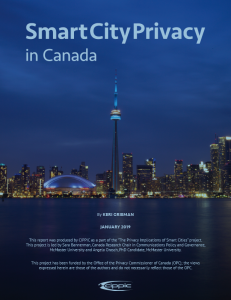Our full report Smart City Privacy in Canada by Keri Grieman, is available here. A draft of our recommendations is available here.
What are smart cities?
Smart cities promise many things – more efficient transportation and travel, reduced resource use, and better access to facilities for residents, to name a few. ‘Smart cities’ as a term encompasses a broad range of technological applications. This can be everything from a single application, such as smart grid usage reducing energy costs, to a section of a city integrating a broad range of smart city technologies, such as Sidewalk Labs’ Waterfront Toronto. Cities are eager to embrace the ‘smart city’ approach both to better inhabitants lives, and to improve efficiency. The core of smart city technologies is data use: analyzing data on how people interact with the city, services, objects, and each other.
Privacy and smart cities
Privacy is thus a key concern for smart cities. The more data that is collected, the more that data can be used, but there is a trade-off between gathering data on or from many people and those individuals maintaining their privacy. While some trade-offs are simple, such as allowing a taxi app to access your location to know where to pick you up, some are more nuanced – should the app be able to know your location and transportation habits in order to offer you ride deals? Should it be able to share your ride habits with advertisers, even anonymously?
Data analytics have evolved to the point that smaller and smaller bits of information can be used to create a model of an individual. Moreover, information collected from a variety of sources can make that model increasingly accurate. For example, an individual using a streaming service may not realize that elements of age, gender, and nationality can be predicted from their music choice.[1] This becomes increasingly important when expanded to smart cities – mass amounts of data are collected, including concrete data such as current location. This data is valuable to companies for purposes such as marketing and behavioural targeting, and also potentially to those intending to infringe privacy directly. Data can also be used in ethically questionable ways, such as discriminatory pricing based on consumer attributes, or the use of racial profiling in advertisements.[2]
Smart City Technologies and Privacy
The report examines the interplay between privacy legislation and smart cities. It asks how Canadian privacy legislation applies in the context of smart cities, and how municipalities aiming to incorporate smart city technologies can navigate applicable federal laws. Part one examines the jurisdiction and applicability of privacy law to smart city contexts. Part two reviews key principles of Canadian federal privacy law that are particularly salient in a smart city context, asking how personal information can be used, and what exceptions exist to privacy legislation that are particularly important in the smart city context. Part three examines specific examples of smart city activities and technologies, and the applicability of federal privacy regimes to each.
———–
[1]Thomas Krismayer, Markus Schedl, Peter Knees, Rick Rabiser, “Prediction of User Demographics from Music Listening” CBMI 2017 Proceeding of the 15th International Workshop on Content-Based Multimedia Indexing Article 8
[2]Office of the Privacy Commissioner “Consent and Privacy: A discussion paper exploring potential enhancements to consent under the Personal Information Protection and Electronic Documents Act” 2016 online at: < https://www.priv.gc.ca/en/opc-actions-and-decisions/research/explore-privacy-research/2016/consent_201605/>
